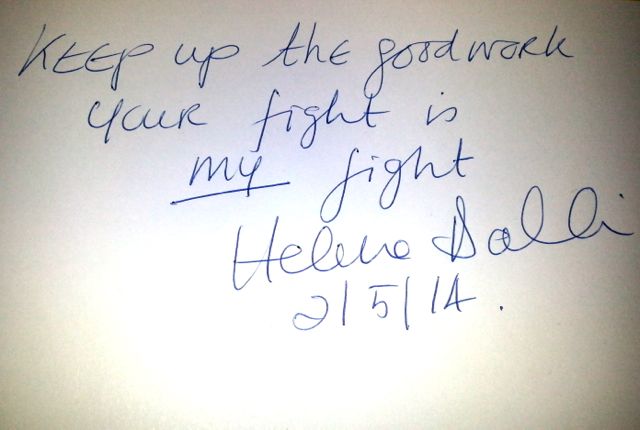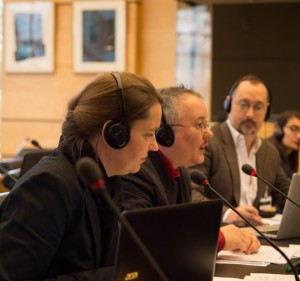April 2015 is for trans* and intersex human rights in Europe a rather fortunate month. On the legal level that is. It still rains trans murders and suicides, not to speak of other atrocities. Which – cynically maybe – show precisely what we need that legislation for.
I want your attention for two cities in two countries for two different important advances. The first town is Valletta, on Malta. The other is Geneva in Switzerland. And then for two more where no less important stones fell in Oslo, Norway and Strasbourg, France.
VALLETTA
Malta just catapulted itself to the vanguard of legal gender recognition for people whose gender identity or gender expression are different from the gender they have been assigned at birth. Suddenly the sun went up over a changed world on April 2, 2015. Now there is a place where intersex people know themselves protected. After putting gender identity in the constitution as a protected ground that bears no discrimination, the Maltese parliament now adopted – with unanimous support – the Gender Identity, Gender Expression and Sex Characteristics (GIGESC) law that regulates how one can change their gender registration. The Act prescribes the gender change procedure to be a written statement made by the applicant to a notary and handed to the civil registry with the preferred gender and first name. Within 30 days the whole procedure should be finished. Minors need to go to court to change their registration, but their interests, as framed in the Convention on the Rights of the Child, are central in the Court’s considerations. Still only accepting female or male, they are looking into the the introduction of a ‘third’ category that is neither male nor female. And a regulation for gender diversity in the school curriculum is in the making. Minister Helena Dalli for social dialogue, consumer affairs and civil liberties wrote a good article on why Malta and why now. Find it at the EU Observer.

OSLO
Shortly after, Norway’s Expert Committee on Gender Recognition presented its report. The conclusions are clear: a huge change is needed in the process to get legal gender recognition. The commission calls for a law, that is based on self-determination. A personal declaration to the national registry authorities should be sufficient, and guardians could file a request on behalf of a minor, upon approval of a regional governor. The second part of the report concerns the right to health-care. Most care should be delivered in regional centres and only expert health care as surgery would be dependent on the Rikshospitalet in Oslo. Justly activists say that on the health level more improvement is needed, since health care demands are – among the population. Plus the needs of the migrant and refugee group within the trans community need to be taken into account.
STRASBOURG
And now this week the otherwise sleepy French town of Strasbourg, where the Council of Europe resides, has a Trans Rights Week in the Parliamentary Assembly. Over the last couple of years there has been made some progress on the level of trans politics here, but this week’s report by Deborah Schembri, from Malta, and the successive debate around a resolution based on this report. Belgian senator and PACE member Petra de Sutter, gynaecologist and trans* woman, held a short moving speech and got affirmative comment from the PACE chairwoman, something quite unusual.
Notwithstanding twelve amendments introduced by one PACE member, the resolution was carried with a vote of 68 in favour, 10 against and 23 abstaining. This means that the Parliamentary Assembly of the Council of Europe adopted the most far-reaching resolution in Europe, calling for quick, accessible and transparent gender recognition procedures based on trans* persons’ autonomy, and good quality, insurance covered trans* health care, that does not require a mental health diagnosis. The resolution advocated for the right to stay in an existing marriage and suggests a ‘third’ option in identity papers to accommodate “those who seek it.” Also the situation of trans* minors got attention: the best interest of the child needs to stand in the foreground and legal recognition of the trans* minor’s gender identity should not be age dependent. Find more on the website of Transgender Europe, that was engaged in the preparations and was invited to speak several times in earlier meetings.

GENEVA
Not only is there a gender domino in which stone after stone seems to be falling, the conclusions on the CRPD (Convention on the Rights of Persons with Disabilities) session of Germany at the UN in Geneva also has caused some firework for the rights of intersex persons. The overseeing Committee reacted positively on a report from Switzerland based Zwischengeschlecht. They answered the Committee’s initial List of issues (LoI) at the beginning of the review process with more issues and with answers and contextualising of several elements. At the end this led to Concluding Observations stating among other things that
“The Committee is concerned about: a) the lack of available data of involuntary placement and treatment; b) the practice of forced sterilisation and coercive abortions by substituted consent of adults with disabilities; c) the lack of implementation of the 2011 recommendations CAT/C/DEU/CO/5, para. 20, regarding upholding bodily integrity of intersex children.”
All in all April 2015 constitutes a really positive start of the second quarter of the year. May more stones fall the coming time!